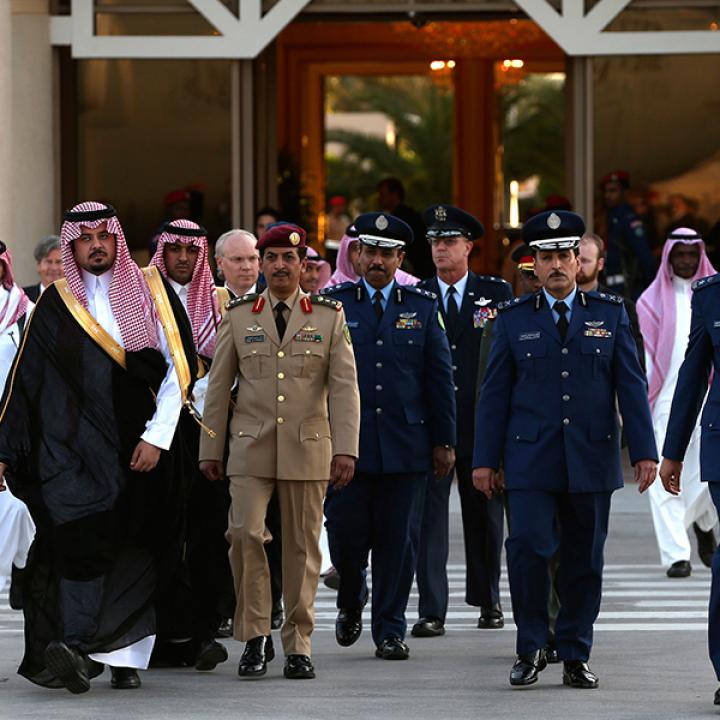

A row has erupted among GCC heavyweights only days after President Trump left Riyadh, potentially undermining the agreed policy of containing Iran.
Provocative rhetoric from Iran's Supreme Leader has exacerbated a diplomatic squabble in the Gulf, threatening to unravel the appearance of unity that President Trump and his Saudi hosts achieved at the previous week's pan-Islamic summits. During a May 27 telephone conversation, newly reelected Iranian president Hassan Rouhani told Qatari emir Tamim bin Hamad al-Thani, "We want the world of Islam, which is suffering from divisions, to advance toward peace and brotherhood, and to this effect we are ready to negotiate to get a real agreement." Yet the impact of this sentiment was promptly undermined by a website comment from Ayatollah Ali Khamenei, the Islamic Republic's true powerbroker, who declared that Saudi Arabia faces disaster in its effort to fight Iranian-backed rebels in Yemen: "Appearances should not fool anyone. [The Saudis] are on their way out. There is no question about that."
On May 28, Foreign Minister Anwar Gargash of the United Arab Emirates tweeted, "The Gulf Cooperation Council countries are passing through a new sharp crisis that carries within it a great danger. Fending off sedition lies in changing behavior, building trust, and regaining credibility." Despite the vague phrasing, the comment was clearly aimed at Qatar, which is at the center of an ongoing media squall. On May 24, the Qatar News Agency quoted Emir Tamim as saying, "There is no reason behind Arabs' hostility to Iran." This prompted a furious reaction from Riyadh and Abu Dhabi, to which Qatar responded by claiming that its official news agency website had been hacked and the report was false. This excuse was greeted with incredulity by Saudi Arabia and the UAE, which then blocked Qatari websites, as did Egypt and Bahrain.
The events appear to be the latest twist in Qatari foreign policy, which is well-known for its contrariness (and contradictions). For example, Doha once irritated Riyadh by hosting an Israeli diplomatic office, only to later expel the mission's members and throw its considerable financial and diplomatic patronage behind Hamas. Qatar has also backed jihadists in Syria who are fighting the Iranian-supported Assad regime. It even supports certain Muslim Brotherhood figures, despite the fact that hereditary sheikhdoms are considered anathema to that group's doctrine. Meanwhile, its comparative inaction on terrorist financing issues continues to aggravate Washington.
Doha's current antics seem to reflect a desire to avoid confronting Iran, whose destabilizing activities in the region were targeted for condemnation in President Trump's Riyadh speech. A short drive outside the Qatari capital lies al-Udeid Air Base, which the U.S. military has used as a major operations and command facility since 2003. After Riyadh asked U.S. forces to leave Saudi Arabia following the 9/11 attacks, al-Udeid became the main base for allied aircraft operating over Afghanistan and Iraq. Today, however, U.S. operations there are subject to tight controls, and Doha could conceivably restrict them further to appease Tehran. Qatar's caution is also rooted in the massive offshore natural gas field it shares with Iran. Known in Doha as the North Field and in Tehran as South Pars, it is the largest offshore gas reserve in the world, helping Qatar become the world's richest country per capita and giving Iran hope for further economic recovery and development.
If the current Gulf row escalates, it could echo past diplomatic crises. In 2014, Saudi Arabia, the UAE, and Bahrain withdrew their ambassadors from Qatar when Doha failed to toe the GCC line on various foreign policy issues. Gulf leaders even flirted with direct intervention there two decades earlier, after Qatar's previous emir overthrew his father. At the time, Riyadh and Abu Dhabi were outraged at what they saw as an unfortunate precedent for Gulf hereditary rule; in response, the Saudis provided support for a failed 1996 countercoup by disaffected Qataris. Such an approach may now find fresh appeal in Riyadh, which is determined to counter Iranian influence by any means necessary. The Thani clan is large, and questions persist about how widely it supports the thirty-six-year-old Tamim, who rules in the shadow of the so-called "father emir," Hamad. Although Hamad abdicated to his son in 2013, Riyadh and Abu Dhabi still view him as the real power in Doha. Amid the latest crisis, father and son stood together to greet well-wishers at a May 28 Ramadan reception.
Additional twists include Gulf reports that Qatari officials have met with Qasem Soleimani, commander of Iran's Islamic Revolutionary Guard Corps-Qods Force. Moreover, the Saudi media has recently tried to undermine Doha's claim that the Thani ruling family is directly descended from Muhammad ibn Abdul Wahhab, the eighteenth-century preacher who founded the Wahhabi branch of Islam practiced in Saudi Arabia and Qatar. Yet Doha may have shown a gesture of compromise toward Riyadh on May 28 when it extradited a Saudi dissident who had fled to Qatar in the hope of gaining asylum in Europe.
For Washington, the priority should be to contain the squabble and safeguard the GCC's unity. In addition to preserving the diplomatic goodwill achieved at the Riyadh summits, such efforts can help stave off further diplomatic escalation, which would only empower Iran. The incident is also a reminder that Doha's unwillingness to cross Tehran might eventually compromise its willingness to host a large U.S. military presence; accordingly, Washington should reexamine existing alternatives to al-Udeid.
Simon Henderson is the Baker Fellow and director of the Gulf and Energy Policy Program at The Washington Institute, and coauthor of its 2017 Transition Paper "Rebuilding Alliances and Countering Threats in the Gulf."



